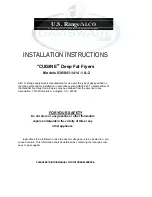
EN
39
Corrugated tubing
If the dryer can not be connected to a permanently
installed exhaust air duct, there is the possibility of
discharging the exhaust air through a corrugated hose .
Installing the exhaust duct
Depending on the structural situation, the exhaust air
can be conducted in different ways to the outside:
•
through a wall box into the open
•
through a window into the open
•
through a wall box into a fireplace or ventilation shaft
Routing exhaust air through a window into
the open
If there is a window at the place of installation, the
exhaust air can be led directly into the open air
through an exhaust air hose through the open window .
►
Lay the exhaust air pipe in such a way that the dryer
cannot suck the moist warm air already blown out
back in again .
►
The outlet opening for the exhaust air must be
designed or laid in such a manner that no additional
counter pressure (e .g . through direct inflow of wind)
can be incurred by the waste air streaming out .
Routing the exhaust air through a wall box
into a fireplace or ventilation shaft
In the case of a connection to a ventilation shaft
insulated against moisture, the responsible chimney
sweep is to be informed and the approval of the local
building depart ment or the owner of the building
must be obtained .
►
At all events, have the safe operation confirmed by
your chimney sweep .
Calculating the total pressure loss
D 200
Load
11 kg
Max . flow rate
480 m
3
/ h
Max . resistance in the installation, supplied by the customer
200 Pa
Exhaust air duct, diameter
160 mm (option)
200 mm
Straight smooth pipes
Pressure loss per meter
4 Pa
2 Pa
Bent pipe, smooth (rm = 1.5 d)
30° bend
2 Pa
2 Pa
45° bend
4 Pa
2 Pa
60° bend
5 Pa
2 Pa
90° bend
6 Pa
3 Pa
Bent pipe, segmented (rm = 1.5 d)
30° bend
4 Pa
2 Pa
45° bend
6 Pa
3 Pa
60° bend
7 Pa
3 Pa
90° bend
9 Pa
4 Pa
Flexible duct hose
Straight hose (Alu), pressure loss per meter
9 Pa
3 Pa
90° radius (Alu / rm = 1 .5 d)
20 Pa
6 Pa
Louvre vent
Louvre vent, steel
70 Pa
30 Pa
Содержание proLine D200
Страница 2: ...DE 2 ...






































